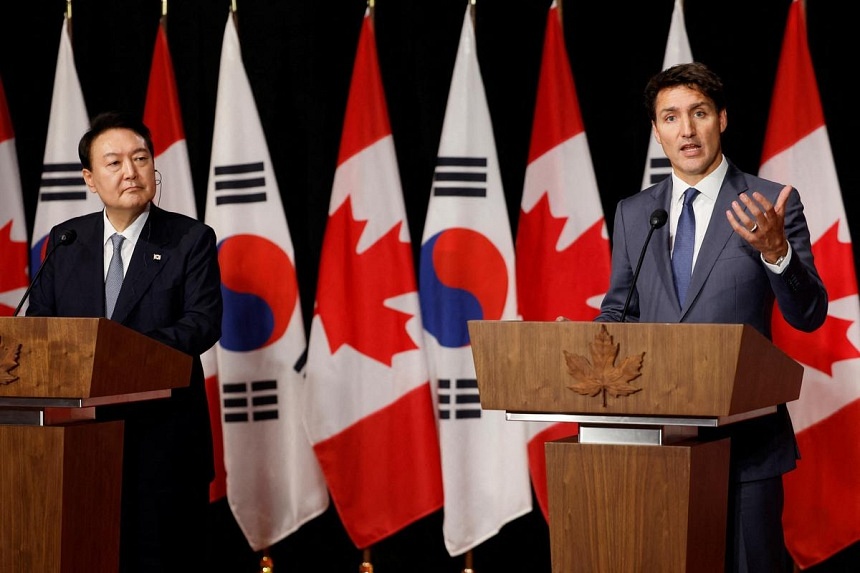Addressing the Geneva-based Human Rights Council, Nicholas Koumjian, the head of the Independent Investigative Mechanism for Myanmar (IIMM), said that in many instances, civilians were “not just collateral damage but rather the target of attacks”.
“Just last week, airstrikes near a night market in northern Shan state reportedly killed about a dozen people, including a pregnant woman and two children,” he said, noting also aerial bombings that struck a wedding party, IDP camps, schools and monasteries.
He added that the Mechanism received many reports and testimonies regarding crimes against the thousands in detention, including torture and sexual assault.
“Victims and witnesses have recounted beatings, electric shocks, strangulations and torture by pulling out fingernails with pliers. There is evidence that minors and other victims of all genders have been subjected to gang rape, burns on sexual body parts and other violent sexual and gender-based crimes.”
Rohingya targeted, again
The situation is particularly alarming in Rakhine state, the site of a brutal crackdown on the Muslim Rohingya community by the military in 2017, leading to the exodus of nearly 750,000 members into neighbouring Bangladesh.
They are once again facing a precarious situation, caught in the crossfire between the Myanmar military and the ethnic armed group, the Arakan Army.
“They have been directly targeted and thousands forcibly displaced from their homes,” Mr. Koumjian said.
He cited a deadly drone attack on Rohingyas who were attempting to flee Myanmar.
“Dozens of bodies, mainly women and children, were scattered beside luggage on a riverbank. The victims were clearly civilians. I cannot imagine anyone believing there was a military purpose to this attack.”
Downward spiral
The situation in Myanmar deteriorated markedly following the February 2021 military coup that saw the elected government overthrown and top leaders including President Win Myint and State Counsellor Aung San Suu Kyi.
Fighting also erupted in several regions between the security forces and ethnic armed groups opposed to the military regime. The ethnic militias have reportedly captured key towns, while the armed forces have employed heavy weapons, including artillery and airstrikes.
Several thousand people are said to have been killed and countless more injured. Tens of thousands of homes and civilian properties have been destroyed or severely damaged.
More than 3,080,000 people are estimated to have been displaced since the coup, and a further 68,000 driven across its borders as refugees, according to the UN refugee agency, UNHCR.
We will follow the evidence
Mr. Koumjian stressed that the IIMM “will follow the evidence wherever it leads” to ensure that the perpetrators of the attack are held to account.
“What is happening today in Rakhine State and across the country is the result of decades of impunity. When crimes go unpunished, this only fuels more criminal behaviour,” he said.
Towards that end, the Mechanism has been sharing its evidence and analysis with authorities conducting proceedings concerning crimes against the Rohingya at the International Criminal Court (ICC), the International Court of Justice (ICJ) and in Argentina.
Despite progress, the IIMM also faces several challenges, he added, including lack of access to crime scenes or witnesses inside Myanmar.
The Independent Mechanism
The Independent Investigative Mechanism for Myanmar was created by the UN Human Rights Council in 2018 and became operational in August 2019.
It is mandated to collect evidence of the most serious international crimes and violations of international law and prepare files for criminal prosecution, making use of the information handed over to it by the Independent International Fact-Finding Mission on Myanmar.
The Mechanism is composed of impartial and experienced professional and administrative personnel. It does not have its own police force nor its own prosecutors or judges.

 By UN (Asia) | Created at 2024-10-29 19:21:04 | Updated at 2024-10-30 03:27:47
1 month ago
By UN (Asia) | Created at 2024-10-29 19:21:04 | Updated at 2024-10-30 03:27:47
1 month ago



